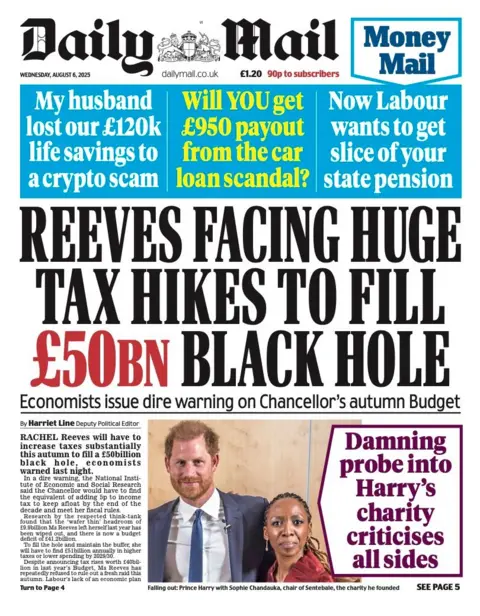The recent reporting around Chancellor Rachel Reeves has centered on significant financial concerns facing the country’s economy, raising alarms about a staggering £50 billion deficit that has led to discussions of potential tax hikes. This financial shortfall, as highlighted by various publications including the Daily Mail and The Daily Telegraph, comes in the wake of research from the National Institute of Economic and Social Research which estimates a budget deficit of approximately £41.2 billion. Such figures have prompted discussions regarding potential fiscal adjustments, including the possibility of increased taxation.
In the Daily Mail’s presentation, it was noted that Chancellor Reeves has not dismissed the idea of enacting new taxes this autumn. This is indicative of the precarious position that the government finds itself in, as public services and welfare rely heavily on adequate funding which is increasingly being jeopardized by these economic constraints. The public discourse focuses not only on how to fill this financial void but also on the implications that such tax increases could have on everyday citizens, potentially creating further socio-economic divides.
Meanwhile, the media reports reflect a broader societal concern, raising questions about the government’s commitment to its spending promises amidst these fiscal challenges. The contrasting imagery of finances and everyday life is apparent, as public interest stretches beyond economic stability to the supportive roles played by societal figures. Notably, Catherine, Princess of Wales, has recently engaged in charity work aimed at providing families with enriching experiences that encourage connections and community support, emphasizing the intertwined nature of governmental and familial responsibilities.
In parallel, crucial opinions are emerging from political opponents, with voices like Kemi Badenoch warning about potential governmental overreach into rural life through suggested tax reforms aimed at high-value farmland. This notion presents a tense standoff between economic necessity and preserving the livelihoods of those in the agricultural sector. Badanoch has characterized these proposals as cruel and unnecessary, igniting a larger debate around rural hardships and the impact of urban-centric policies.
The media coverage is multifaceted, with each outlet presenting its interpretation of the situation. The Financial Times highlights Neil Woodford’s recent fine of £46 million, emphasizing a lack of oversight and accountability within financial systems. This coverage underlines public concerns about economic leadership in both corporate and government spheres. The echoes of such financial mismanagement resonate deeply within consumer sentiment, resulting in heightened demand for transparency and responsibility across all sectors.
Additionally, there are reflections on various humanitarian crises plaguing the world, such as the devastating situation in Gaza which The Guardian illustrates as reminiscent of an apocalyptic aftermath. Their reporting brings essential context to the ongoing struggles, reminding readers that economic troubles are not limited to a singular narrative but exist alongside various overlapping global issues.
The diversity of headlines illustrates how interlinked financial, political, and humanitarian topics are in today’s news landscape. From the Metro’s critical phrases about corporate failures leading to tragedies, to the Star’s more whimsical portrayal involving law and order in animal behavior, the media captures a wide range of public interests. This engaged scrutiny invites readers to reflect on their role in society and how they might contribute to public discourse.
In summary, the repercussions of the £50 billion financial shortfall are significant, reflecting broader socio-economic dynamics at play. The conversations surrounding personal finance, government accountability, humanitarian needs, and community welfare illustrate the complex interplay of fiscal realities and everyday life. The potential responses from government officials, charities, and everyday citizens will shape the nation’s path forward as it confronts these challenges.












